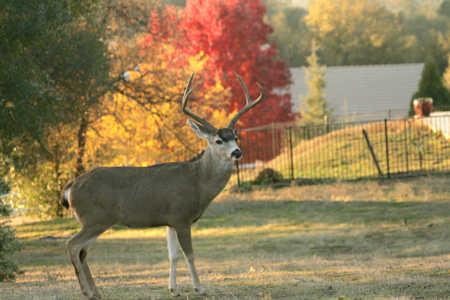
California’s wildlife is one of its greatest treasures, and the California Department of Fish and Wildlife (CDFW) is committed to protecting and conserving this important resource.
As the drought continues into the summer months, CDFW reminds residents to be mindful of their actions in the outdoors and to take measures to discourage wildlife from coming into contact with humans.
“During times of drought, animals may have to search farther for food and water,” said Marc Kenyon, CDFW senior environmental scientist. “Although these periods can be stressful for animals, they are also a natural part of ecological systems that regulates their numbers. In nature, we must realistically expect some starvation and overall increased mortality. Otherwise, nature wouldn’t be natural.”
Well-intentioned residents who set out food for wild animals are actually doing them no favors, particularly for large animals.
Feeding deer may cause them to congregate in small areas in unusually high numbers, which can cause the spread of disease and increase the likelihood of collisions with vehicles.
Deer also may attract dangerous predators like mountain lions to residential areas.
Careless campers and residents who fail to secure their garbage can also cause problems. The scent of trash, particularly leftover food scraps, will lure bears out of the woods. They are likely to return again and again in search of an easy meal.
Habituated bears can cause extensive property damage, and some ultimately have to be killed.
Both deer and bear are considered “big game”mammals and it is against state law to feed them. A citation could lead to hefty fines and jail time.
“Reports of wildlife sightings have become quite common with the increased use of cellphone cameras and social media, and with increased development into largely undeveloped areas,” said Kenyon. “In most cases, wildlife sightings are not a cause for alarm and are not necessarily due to the drought. Wildlife lives in the hills, fields and forests all around us, and we must do our part to help them maintain their natural ways.”
Follow these “Keep Me Wild”tips to help ensure you are not attracting wildlife to your property:
- Secure trash in bear-proof cans and don’t wheel them out until collection day morning.
- Don’t leave trash, groceries or animal feed in your car.
- Harvest ripe fruit off trees and promptly collect fallen fruit.
- Do not use birdfeeders.
- Keep barbecue grills clean and stored when not in use.
- Don’t leave any scented products outside (i.e. suntan lotion or candles).
- Keep doors and windows closed and locked.
- Install motion-activated alarms, sprinklers and/or electric fencing.
- Landscape with deer-resistant plants and install high fencing around gardens.
- Remove shrubs and debris piles that provide hiding places for mountain lions.
- Secure livestock in sturdy enclosures.
- Do not leave small children or pets unattended outdoors.
- Keep pet food and water dishes indoors.
If you aware of someone feeding wildlife, please call 1-888-CALTIP (1-888-334-2258).
For more tips, please visit www.keepmewild.com .